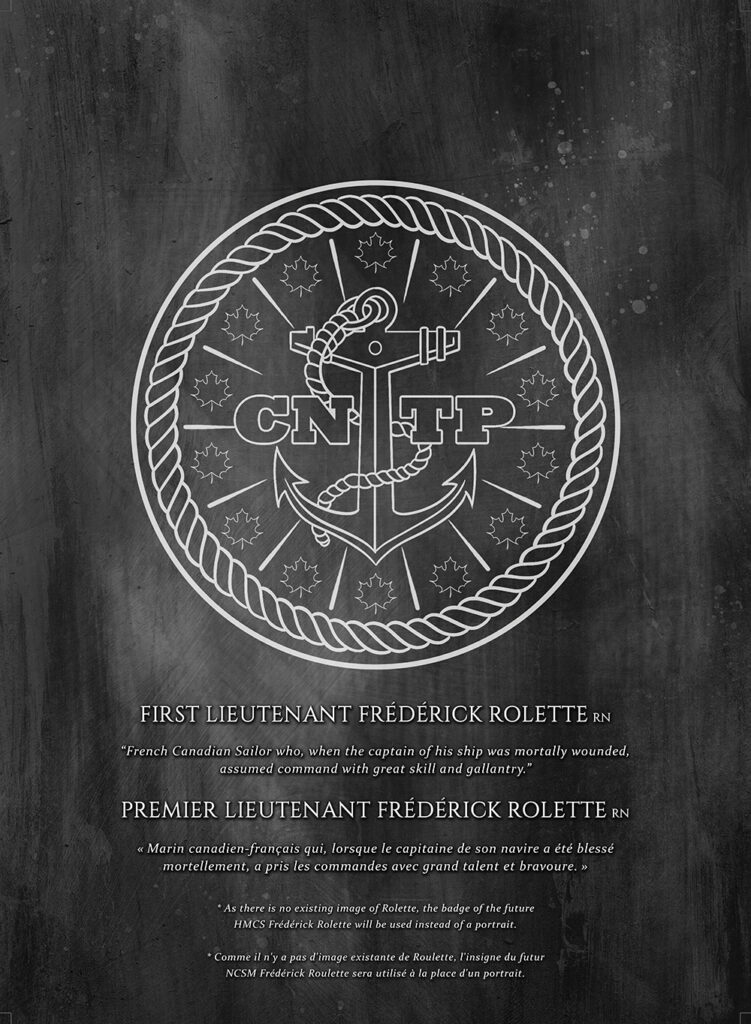Commander Isabel Macneill OC, OBE, WRCNS
“First woman to command a ship (Stone Frigate) in the British Commonwealth”
Isabel Janet Macneill’s career was marked by many “firsts”. Born in the capital of Nova Scotia on June 4, 1908, she attended Halifax Ladies’ College, a “high class residential school for girls and young women”. She was granted admittance into Mount Saint Vincent Academy (present day Mount Saint Vincent University), an independent women’s college, and graduated in 1926. Macneill then pursued a passion for art, first attending the Nova Scotia College of Art before heading overseas to the Heatherly School of Art in London, England. There, she worked in theatre as a scenic designer before accepting a teaching job in the United States, moving to Massachusetts to become a dramatic art teacher at Sea Pine School on Cape Cod. Macneill also taught at Fairmont Junior College in Washington D.C.
With Canada’s declaration of war against Nazi Germany, and the United States refusal to enter the conflict, Macneill’s desire to contribute to the war effort made her leave her teaching position and return home to Halifax. She immediately began volunteering at the North End Services Canteen, a spot for servicemen heading overseas to grab some food and rest their feet, and later took on the role of secretary and cofounder of the Ajax Club in August 1940. Located at the Odell House at the corner of Queen and Tobin Streets, the club was sponsored by the Interallied Hospitality Fund and aimed to “… uphold the morale of servicemen, to bring warmth and joy into their lives, and help them forget the grim realities of war.”
Finally, in 1942, Macneill found an opportunity to serve in uniform, joining the newly founded Women’s Royal Canadian Naval Service (WRCNS) in August. She was one of the first Canadian “Wrens” – the nickname given to members of the British Women’s Royal Naval Service (WRNS), first founded in 1917 – and graduated at the top of her class, earning her a commission as an officer. It was then off to attend specialty training for female officers at HMCS Conestoga, a shore establishment in Galt (present day Cambridge). Originally a detention centre for ‘wayward’ girls, Grandview School for Girls had been appropriated by the RCN to serve as location for the basic training of Wrens.

Macneill’s drive saw her quickly rise through the ranks, and in 1943 she earned a promotion to Lieutenant-Commander and was appointed Commanding Officer (CO) of Conestoga, making her the first – and only – woman to command a ship (stone frigate) in the British Commonwealth during the war. And as CO, she was now “… the only woman outside the British Royal Family to rate being piped aboard a warship, an honour usually reserved for flag officers or special guests.”
Macneill worked tirelessly at her new role in training future Wrens. She was well regarded by her subordinates for her strength and compassion. She was often seen accompanied by her Dachshund “Trilby”, who obediently followed at her heels, even when inspecting Wrens during divisions. As noted in an article written in the Tiddley Times (Wren’s newspaper), “Every Wren is familiar with the sight of the CO striding into the lecture hall, up to the platform, then standing for a moment, waiting. There is a silence. Then the ticking of nails on hardwood floors as Trilby comes hurrying up the aisle and scrambles up the steps. Then, and only then, does the lecture begin.” The article also notes the commanding presence Macneill had as CO. “When she is speaking to a group of probationary Wrens of the tradition behind the navy in which they are serving, or when she deals with captain’s defaulters on the quarterdeck, she can be as stern and majestic as any ‘old man’ on board a flagship of the fleet!”
Her efforts to train young Wrens earned her the respect and admiration of all who served with her at Conestoga. When called to Britain in February of 1944, one trainee was quoted “… we hated to see LCdr Macneill go! It was a bit like losing a precious part of Canada.” In June, she not only earned another promotion to Commander but also the honour of being named an Officer of the Order of the British Empire (OBE). Macneill’s citation summarizes the significance of her contributions to the RCN:
Lieutenant-Commander Macneill has served with the WRCNS since its inception. She is the first and only woman in the Canadian Navy to be in command of a ship. As commanding officer of HMCS Conestoga, she has been responsible for the basic training of almost every member of her service. Her wide knowledge, her profound sympathy and her unfailing and inspiring devotion to duty have made her contribution one without parallel in the service.
Indeed, Macneill was responsible for the training of nearly 6,000 Wrens during the war. In 1945, HMCS Conestoga was closed and Macneill was appointed a Staff Officer Wrens to the Commander Atlantic Coast. Then, in April 1946, the service was disbanded – it seemed that Macneill’s naval career was at an end but her time at Conestoga would, in a way, continue as the building would once again resume its role as a correctional centre for young girls. Due to her previous role and experience as an educator, Macneill was an easy choice for the role of Superintendent and she accepted the position, taking charge of the Ontario Training School for Girls in 1948.
Established back in 1933, the school operated as a quasi-jail for young delinquent girls between the ages of 12 and 18 “convicted of petty offences or were runaways, beggars, truants or simply deemed incorrigible.” The conditions were harsh, and the girls were often treated in demeaning ways by staff. Feeling the school did little to encourage positive development in its ‘students’, Macneill set out to overhaul the system. Over the next six years, she ushered in sweeping improvements that transformed the school from prison to an institution that provided skillsets and treated the girls in a humane manner. Supervisors took a more sympathetic approach and were supported by a team of teachers, caseworkers, psychologists, and even a psychiatrist, who helped to encourage the positive development of students. For her efforts, Macneill was awarded the Coronation Medal in 1953.
In 1954, the navy decided it would create a permanent female component of the RCN and called upon Macneill to assist. The following year Cabinet approved the motion and, for the first time in any of the Commonwealth’s navies, women were formally integrated into the regular force. In 1957, Macneill left the RCN for the last time.
Macneill returned to correctional services and in 1959, travelled to Europe to study various approaches to running prisons for women. Upon her return, she became first woman superintendent of the federal prison for women in Kingston, Ontario, and challenged established practices. For Macneill, prisons needed to focus on rehabilitating prisoners rather than punishment by incarceration and degrading treatment. She took a page from her success in Galt, forming a team of professionals to assist prisoners with personal growth and encouraged academic and vocational training.
In 1966 Macneill left the correctional service and joined the Ontario Alcohol and Drug Addiction Research Foundation, leading a study on substance abuse in Toronto. Over the following two years, she assisted both men and women suffering from drug addictions and her report was key in the improvement of treatment practices.
In 1971, Macneill was invested as an Officer of the Order of Canada and in 1977, was awarded honouary doctoral degree (in law) by Queen’s University, followed by another from Dalhousie University in 1981.
In retirement, Macneill continued to be active, acting as the director of the Canadian Institute for the Administration of Justice from 1979 to 1982, and then became the first woman to serves on the board of governors of the Nova Scotia Division of the Canadian Corps of Commissionaires, which she served until her death in 1990 at the age of 82. The Isabel Macneill House, a transitional residence for women offenders in Kingston, was named in her honour.
MacNeil’s Awards and Decorations:
Officer of the Order of the British Empire 1944; Canadian Voluntary Service Medal; 1939/45 War Medal; Coronation Medal 1953; Officer of the Order of Canada 1971; Silver Jubilee Medal 1977 (automatically awarded to every living member of the Order of Canada).
Sources:
https://www.thecanadianencyclopedia.ca/en/article/isabel-macneill
https://www.canada.ca/en/navy/corporate/history-heritage/canadian-naval-heroes/isabel-macneill.html
https://unravelhalifax.ca/local-history-how-a-halifax-woman-helped-reform-canadian-prisons/
https://www.msvu.ca/about-msvu/university-profile/tradition-and-history/
https://www.canada.ca/en/navy/services/history/ships-histories/conestoga.html
Prepared By:
Sean E. Livingston, Co-Founder CNTP and Author Oakville’s Flower: The History of HMCS Oakville


